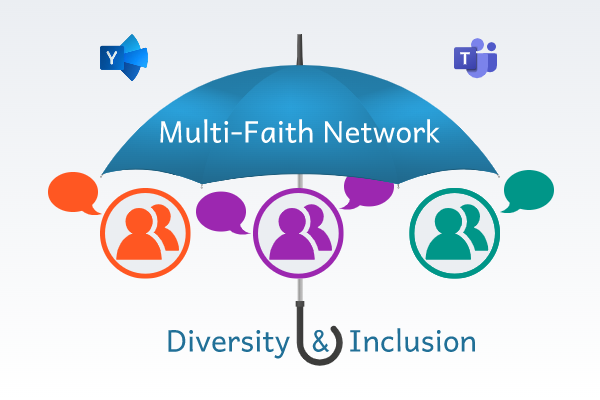Multi / Inter Faith - An Introduction
 According to google searches...
According to google searches...
What does multi faith mean?
: involving, relating to, or made up of people of more than one religion
To be multifaith is to feel an affinity with aspects of more than one religion, philosophy or world-view, or to believe that none of them is superior to the others.
What is the meaning of interfaith?
: involving persons of different religious faiths.
Interfaith dialogue refers to cooperative, constructive, and positive interaction between people of different religious traditions (i.e. "faiths") and/or spiritual or humanistic beliefs, at both the individual and institutional levels. It is distinct from syncretism (the amalgamation or attempted amalgamation of different religions, cultures, or schools of thought) or alternative religion, in that dialogue often involves promoting understanding between different religions or beliefs to increase acceptance of others, rather than to synthesize new beliefs.
As adjectives the difference between interfaith and multifaith is that interfaith is involving members of different religions while multifaith is feeling an affinity with aspects of more than one religion, philosophy or world-view, and to believe that no one is superior to the others.
What has inter or multi faith forum got to do with work?
An organisation may start a multi / inter faith forum or faith network in response to the Equality Act 2010 to ensure that all faiths are equally represented in the workplace.
Multi faith forums and faith networks can provide the ideal opportunity to create a Christian group. A number of Christian groups have great working relationships with the multi faith forums in their organisations such as Rolls Royce, Network Rail the Cabinet Office…
Key objectives of a Faith Network
-
Support the Board’s commitment to the Diversity and Inclusion legislation and agenda with respect to faith; in particular, ensuring that the company’s policies and practices do not discriminate against any faiths
-
Empower employees to be open and honest about their faith and to bring the whole of themselves to work
-
Educate staff with a better understanding of different faiths, how these influence approach to work and how individuals of faith can best be supported
| The Christians Workplace Group in Royal Bank of Scotland organised an interfaith panel discussion. It turned out to be a thought-provoking look at the factors shaping both individuals' morals and the company values |
| On Monday 16th January 2023, faith representatives from Thames Water, OVO Energy, Rolls-Royce met at the University of Derby Multi-Faith Centre (MFC). |
| Faith networks are often badly supported or missing completely from an organisation's Diversity policy! Here's our response... |
| Thames Water recognise the benefits of providing facilities for Christians and followers of other religions who work for the company, and are providing 'faith rooms' at various locations in the workplace |
| Multi faith forums and faith networks can provide the ideal opportunity to create a Christian group. |
| Do let us know if you have any other questions to add to this list |
| Multi faith forums - Obstacle or Opportunity? |